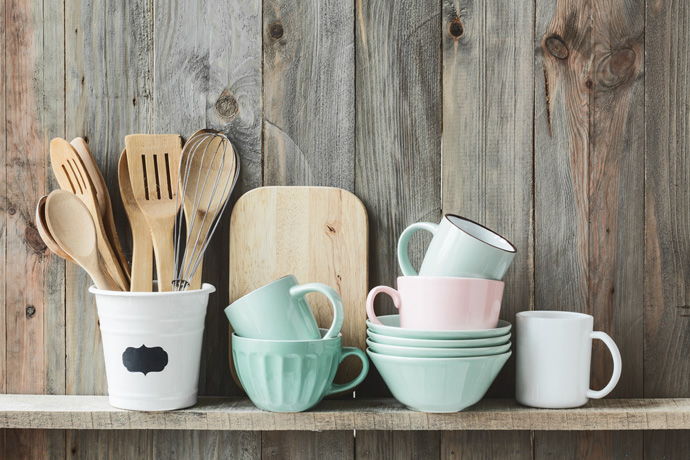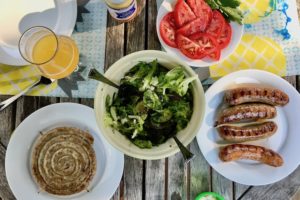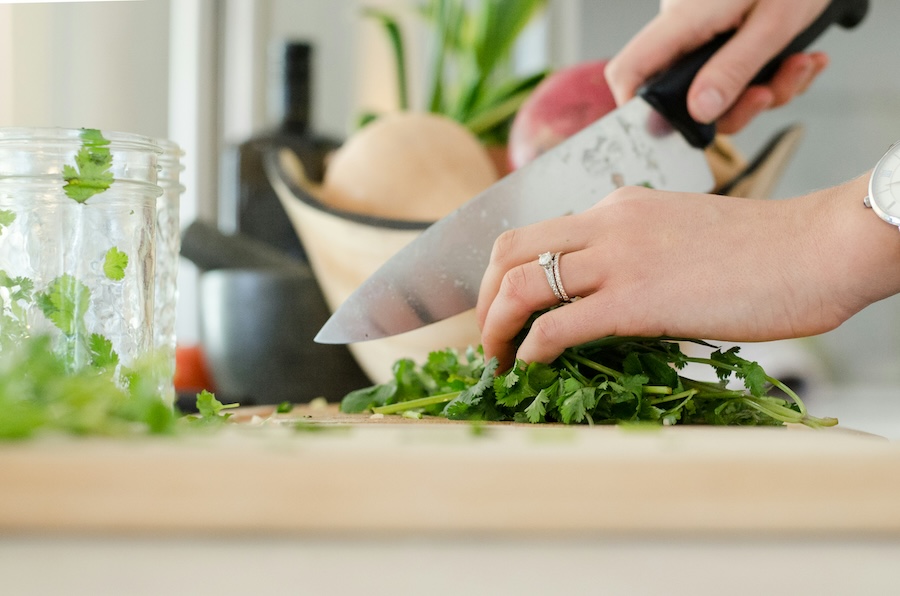The end of July and early August mark the end of summer for many, so it’s no wonder that it’s also the most popular vacation time of year for families. Here at Cool Mom HQ, we are big fans of renting a vacation home over a hotel room(s) not only because you get more bang for your buck (thank goodness for separate sleeping spaces!), but also because having a kitchen makes mealtimes so much easier. Of course, you can still go out to eat, but you don’t have to go out every night. And when dining with kids, we all know what a relief that is.
In order to maintain the savings and also to avoid tons of food waste, we’ve come up with 8 smart tips for how to stock a vacation rental kitchen without breaking the bank.
CME is an rStyle and Amazon affiliate.
Related: 5 easy ways to eat healthy while traveling with kids.

Pack some can’t-live-without essentials
The first thing that I do when I rent a vacation home is ask about what kitchen tools will be available. Coffee maker? Grill? Mixer? Sharp kitchen knives? (Because, yes, I seriously cannot cook without sharp kitchen knives.) Whatever they don’t have that I know I need gets packed in my bag. Well, at least if I’m driving. If you’re flying, prepare to live with whatever they’ve got, but also know that it’s reasonable to at least ask the owner or rental agency to help you out if something critical is missing. For example, no rental should be without a way to make a cup of coffee. At least not if they’re renting to families.
My knives and other small kitchen equipment (I’m looking at you microplane), aren’t the only things that I pack. I also often bring a few essential ingredients that I know can be hard to find or are only available at too-great a cost or quantity for my short rental period. Case in point: crunchy Maldon sea salt. This stuff makes the simplest meals and salads better, so why not pack a little baggie. It’s so much more cost effective than buying an expensive box and having to leave it behind or pack it up for the trip home. Also, that Aleppo pepper I’m obsessed with? Pack it in a baggie. You should do the same with your favorite spices.
Related: The best travel snack recipes to pack, to make getting there a breeze.
Take stock of what’s already in the rental pantry
Once you’re at your home-away-from-home, take stock of what’s already in the kitchen. In particular, look for things like oil, vinegar, salt, pepper, other spices, flour, sugar, and other pantry basics. And—this is important—check the expiration dates or use our tips to determine if food is still fresh.
Plan your meals
With a clear sense of what you have to work with, from the tools and ingredients that you brought to what’s available at the house, you can meal plan. I know, I know: It’s everyone’s least favorite job, but it especially helps to keep you on budget and reduce food waste when you’re at a rental property. So, if only for the duration of your vacation, just do it.
The key to planning great, budget-friendly vacation meals is to think about how to maximize ingredients so that you can cook once, eat twice. I talk about this a lot in my new cookbook, Make It Easy (which, by the way, is the perfect vacation house cookbook with its super easy mix-and-match recipes and supermarket guide). So for example, if you plan on eating rice as a side dish one night, make a double batch so that you can use the leftover rice for fried rice on another. Not only does this cut down on your cooking time—this is vacation, after all—but it also helps you use up that whole box of rice to reduce waste. Check out more meal planning tips that I shared over at Mind Body Green. (They’re useful for when you’re at home too.)
To get you started on thinking about super easy, fresh family meals, check out our favorite sheet pan dinners, no-cook dinner recipes, one pot meals, kid-friendly vegan dinners (to save money by cooking without meat and with affordable seasonal veggies instead), and our meal plan archive for several 5-day meal plans that are ready to go.
Grill
While planning meals, I want you to strongly consider grilling as much as possible. Not only does it make for quick cooking and easy cleanup, but also big flavor without a whole lot of fuss. For animal protein, you often need nothing more than salt and pepper—maybe a few spices if you’ve brought them along or can find them in the bulk bin (see below). Grilled veggies definitely need little more than oil, salt, pepper, and if you’re feeling fancy, a drizzle of vinegar. Instead of needing sauces and lots of accoutrement that add up at the grocery store, you can finish simply grilled foods with butter, fresh herbs (see below), compound butter (so easy to make), crumbled cheese, or a simple vinaigrette.
Related: Best grilling recipes for summer cookout season.
Skip dried spices
With a meal plan in tow, you’re ready to hit the market. My number one rule for cooking while at a vacation rental is to never, ever buy dried spices unless they’re available in a quantity that I can control from the bulk bin. Think about how long you’ve had spices in your pantry: You’ll literally leave the money you spent on spices behind. Again, pack anything you cannot cook without or get creative with lemon, other citrus, olive oil, garlic, and fresh herbs, which are usually available in small, usable quantities.
And don’t forget our cook once, eat twice rule: If you buy a big bundle of fresh basil for a quickie tomato sauce, like the Freezer Tomato Sauce that we found at Leite’s Culinaria (that is just as good fresh), also plan on making grilled pizzas another night, and pesto that you can toss with pasta for dinner, mix with mayo for lunch sandwiches, or shake into a basic vinaigrette for salads or grains.
Shop the bulk bins
Also while at the market, be sure to hit the bulk bins. Not only are ingredients there usually less expensive, but you can also control the amount and they come in less wasteful packaging (because, is it me, or is it always a big to-do to figure out recycling at vacation homes?!). In other words, you can buy just what you need. Grab oatmeal for breakfast; nuts, seeds and dried fruit for snacks; pasta, grains and beans for dinner; and, yup, those dried spices.

Don’t forget the local farmer’s market
I end up cooking primarily vegetarian while on vacation, especially in the summer when produce is gorgeous all around the country. It also means that I can skip meat of unknown origin from the grocery store; if that’s not important to you, skipping meat also just plain saves money. Produce, especially in late summer, is abundant everywhere and usually less expensive at the local farmer’s market. It also just tastes better, so if you have the time to hit both the grocery store and a farmer’s market, it’s usually a good idea.
Use baking mixes
Of course, if we’re talking vacation, we’re talking dessert. (Right?!) Homemade summer desserts are the best—from crisps to crumbles, cobblers to grunts, delicious fruit dessert recipes, or even just grilled fruit desserts—fresh fruit and seasonal ingredients help keep dessert simple. If you go for pie, though, or end up wanting cake or brownies, grab pre-made crusts and baking mixes. Yes, they’re more expensive than flour, sugar, and baking powder, but all of those things are hard to find in small enough quantities. When you figure in the food waste, you’ll find that going with store-bought crusts and mixes gives you more value for your money.





![Save yourself some time with our cheat sheet of foods you never need to both washing -- and a few that you should always. You may be surprised (we were)! | Cool Mom Eats [Photo by Davide Ragusa via Unsplash]](https://coolmomeats.com/wp-content/uploads/sites/5/2018/02/foods-that-should-never-be-washed-davide-ragusa-unsplash-300x200.jpg)

Great tips! We travel in our trailer for a large part of the summer, so before we leave, I make up my own baking mixes for beer bread (just add beer), brownies (add oil and egg), biscuits, cobblers, etc. Then the baggies of mixes go in the trailer pantry and they’re ready to be made up whenever we want with just a few extra fresh or frozen ingredients!
So smart, Jaime! (And beer bread… mmmm.) Your tips would even be helpful for at home during particularly busy months, like during this crazy back to school season.